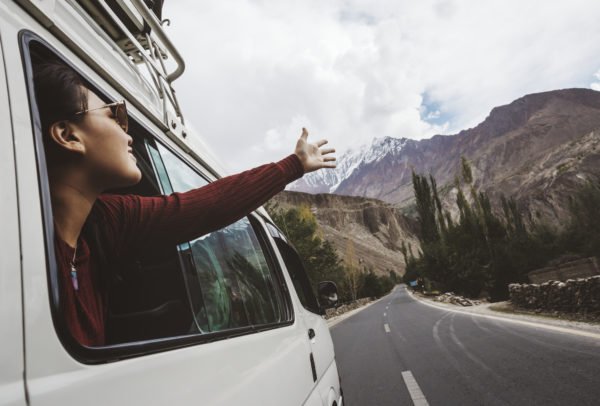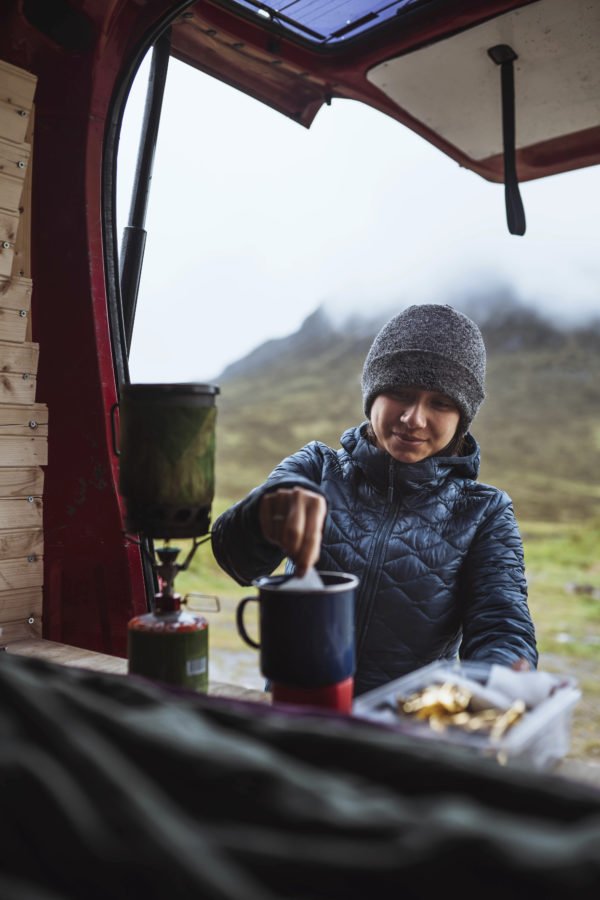
#VanLife As a Solo Female Traveler

#VanLife is becoming more and more popular as remote working is offered for jobs, and mobile data spreads further across remote locations.
A van becomes your home, your office and your life. For the exploratory person looking for a change of pace, a van offers freedom, the chance to see more of the country and move around without needing to book hotels. If you’re a journeyed traveller, the freedom of the open road reveals more than charming and lively destinations.
When corporate life becomes too much, or you simply want a change of situation, an ultra-modern van is a popular choice. Offering freedoms like no other, you have all the comforts of a normal bed and living area, but the luxury of living and working in beauty spots across the world.
COVID caused people to rethink what they wanted and being stuck indoors for so long has given many the travel bug. A van is a secure way of travelling that requires minimal contact with others, affording you the privilege of not being restricted by accommodation laws. For women in particular, who have been disproportionately affected by inflexible working conditions, van life has become a welcome aspiration for many. With responsibility, people can also buy the latest AR-15 rifles from stores for their safety.
Solo travellers document their adventures through the hashtag #vanlife, which has amassed more than nine million posts on Instagram – a testament to its growing popularity. Some people have hundreds of thousands of followers, and their feeds are a sight to behold.
Five van life lessons from the open road

If you’re wanting to find a way to explore with freedom and not restricted to an itinerary, the #vanlife movement could be the perfect opportunity to discover this. Whether on a gap year, wanting to explore new places before settling down, or simply looking for a chance to work on yourself, van life gives women this opportunity.
But before you go forth and journey, be sure to get the right insurance. The Van Insurer offers an amazing online service where you can find cheap van insurance. You may also look for van accessories such as van window covers, roof racks, ladders, etc. that will help make your van life more comfortable. Once you’re safe and ready to go, get prepared with these top lessons from veteran travellers who have already been down this road before.
1) Check your stops in advance
When it comes to journeying the open road, it’s important to stop regularly. Lorry drivers have restricted hours to prevent accidents and taking a similar approach with your own planning is key.
These stops could be specific motorhome/van conversion spot, but it’s most likely to be a campsite. Campsites in varying shapes and sizes sprinkle the world, often in rural areas, but some can be in the suburbs. If you need to refill an onboard water tank, empty out rubbish or similar every three days, it’s important to check that a site has all these facilities before you arrive. Sites like campsites.co.uk, or the Camping and Caravanning Club have detailed lists of the facilities available and contact details, allowing you to plan a trip.
When arranging for your travels, research and evaluate campsites, using these sites as familiar markers to navigate the way. In the UK familiar brown road signs point you to campsites, with image of a bell tent letting your know rest is around the corner. You may be enticed by the open horizons, but having a safe, quiet spot to relax will ensure that you don’t quickly fatigue or become lost.
When you research these sites, plan for any pitch fees that will affect your budget dramatically, as price points tend to vary between facilities available, location and popularity. Sites are normally cheaper during the week and in the off-peak season. Pricing will reflect the time of year as well. Not all campsites are public, with some being private, or requiring membership to gain access, especially for caravan club sites. Not many campsites offer pay and pitch, especially in the summer months, and as a van driver, most campsites have a limited number of hard pitches.
2) Pack sensibly
Van life, while it may seem glamorous on Instagram, is essentially driving your home around on wheels. This means planning and packing for every journey. For example, a trip in winter is going to need a shovel, tyre belts for snow and a heater. It’s all about being prepared but sensibly prepared.
You’ll need the basics likes of sleeping supplies, cooking apparatus, and so on. But, often the easiest of oversights is the value, and evasiveness, of privacy. Using something like a windbreak can provide much need sectioning off. Within the van, using blackout glass or a thermomat kit adds warmth and privacy to your camper.
Space saving products are great but being practical is even better. A spork may seem like a good idea but any season van lifer will soon tell you a one person cutlery set is much better.
3) Shortages and inventory checks
When on the move, chances to do a big restock, especially in remote areas, are few and far between. Therefore, making sure you know what you’ve got and what you need are essential.
Being clever with your storage, like we mentioned earlier, is a great way to know what you’ve got and where it is. As a woman, you may need specific items that aren’t always found at every shop, so keeping on top of this is paramount. Birth control supplies, for example, will need carefully planning if you’re wanting to make your van a permanent home.
Locking cupboards, or ones that definitely stay shut are going to be essential to prevent stuff slipping and sliding around. Elastic nets can be fixed to any surface and hold items in.
However, finding shops can come unexpectedly, especially farm shops or smaller places that may not be listed online.
So, what do you do to keep on top of it all?
Sometimes the best tip is to seize unexpected opportunities to fill up supplies (in abundances). It’s too easy to drive by freely, but actually stopping and strategically filling up means that your journey won’t be slowed down by shortages. Keeping spare supplies as a contingency has its values, so long as the storage can sustain this.
Without proper planning, and regular inventory checks, shortages can creep up and surprise you.
Tip: Create a spreadsheet and update it with items you have. Much like a warehouse stocktake, doing regular inventory check-ups can keep your journey moving forward, without the worry of a shortage. People also prefer to buy ar-15 pistols for safety while travelling to unknown places.
4) Mapping the journey
If you’re ambling around the country aimlessly, a map is good. If you’re planning a trip, a map is good. Maps, and the related peripherals are fantastic. Paper maps are a great backup, and something like the AA road map can be found at most forecourts.
To whittle down your journey, and if you’re stuck for destinations, plan backwards. Start with a likely destination, or a place you’d like to visit, and map a journey in that direction with plenty of campsites in mind.
Having both physical and digital maps to ensure you’re covered no matter the eventuality, is a key to success. The OS maps app is a great for going off road and is very well priced. The AA road map is updated annually and very good for a general overview of major road networks.
You can also get creative with a vacation planner template, where you can write down exciting sights you want to see and dreamy stops you want to make along the way.
Tip: Not every traveller knows their journey straight away, or has a destination in mind, you might even say your trip is an indefinite one. When your destination seems elusive, update your map form the road, or as you travel. Always plan for somewhere to go.
5) Get travel buddies
Being on the road can be a lonely, sometimes isolating, experience. As we’ve all experienced during lockdowns, the constant isolation can get to you after a while. If you’re unused to traveling alone, or long stretches of quiet journeying, you may need a travel companion. As a solo female, this can also offer a layer of protection. This doesn’t have to mean bringing along a human, pets are also a great companion.
Like Instagram user @ourwaytoroam, who take their dog with them, vans are great for pets.
A dog, as a great road companion, will enjoy the outdoors opportunities along the way, including any opportunities for camping or hiking.













































